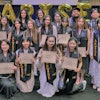The intersection of Asian and Latin American studies has produced a burgeoning new field in transnational studies.
Dr. Jerry García was so taken aback when he first heard of Japanese Mexicans that his curiosity about them never faded during his military service or subsequent college career. For his dissertation, he wanted to write about Mexican immigration but didn’t find an aspect that hadn’t already been done, in some cases multiple times.
Ultimately, he explored Japanese migration to Mexico and subsequent assimilation. The decision added a unique dimension to his ongoing research in Mexican American labor history.
“The struggles of the Japanese in Mexico have some parallels with Chicanos in the United States,” says García, now an assistant professor of history and Chicano/Latino studies at Michigan State University.
García is among a growing number of U.S. scholars whose expertise and writings shine a spotlight on the connections between Asian and Hispanic populations and cultures.
“So much of the focus in popular culture and the media is on strife, but there are a great deal of interrelations between Asians and Hispanics,” says Dr. Jinah Kim, a Northwestern University lecturer and assistant director of its Asian American Studies program. Among other things, she examines the differential racialization of Hispanic and Asian immigrants through multiculturalism and romanticized representations of the Asia- Pacific region.
Of course, the notion of Asians living and thriving among U.S. Hispanics as well as the Asian diaspora in the Caribbean, Mexico and South America is by no means unfathomable. Nor is it new. Take world politics, for example. Peru elected Alberto Fujimori its president in 1990, an office he held for 10 years. Fujimori’s parents had emigrated from Japan before World War II.
Only about 20 years ago did U.S. scholars begin taking a closer look at the stories of how and why people left the Far East for countries such as Brazil, Cuba and Peru, says Dr. Evelyn Hu-De- Hart, a Brown University professor of history and ethnic studies who is considered a pioneer in the study of Asian-Hispanic intersections. She is also director of Brown’s Center for the Study of Race and Ethnicity in America.
The Asian Diaspora in Latin America
Hu-DeHart’s path to researching Asian diaspora in Latin America was an accidental one. As a Stanford University undergraduate studying political science in the 1960s, she spent one summer in an exchange program traveling throughout Brazil, where she was shocked to come across Japanese Brazilians. What she would learn was that thousands of Japanese migrated to Brazil many decades earlier to work on coffee plantations, unable to gain work in their homeland. Many stayed after plantation contracts ended, often buying enough land to farm themselves. Their descendants typically moved to bigger cities, integrating into urban life.
“We ran all over the country,” Hu-DeHart says, referring to her summer in Brazil. “My life hasn’t been the same since.”
Those travels sparked a lifelong interest in Latin America and spurred her to seek a doctorate in history. After earning it in 1976, she established herself professionally through researching the Yaquitudying only our own communities.”
Indians of Mexico and Arizona and publishing two books about them. She taught Latin American history at various public and private universities and, after gaining tenure, began delving more deeply into transnational Asian communities. Tens of thousands of Chinese, for example, left their overpopulated homeland for other countries in the 1800s to labor in mines and fields and to build dams and railroads in order to send money back to their villages. In some cases, they started restaurants and businesses that catered to workers in construction, mining and agriculture.
Hu-DeHart has written extensively on Chinese settlements in Cuba, Mexico and Peru, and her course on the Mexican Revolution is her favorite to teach because her research on Chinese Mexicans is situated within the decade-long revolution that lasted until the early 1920s. In the revolution’s aftermath, a nationalistic, sometimes xenophobic, sentiment swept the country, resulting in backlash against the Chinese there. Hostilities led to violent attacks against the Chinese and expulsion of them from some parts of Mexico.
The fact that the Mexicans of that period had prejudices against the Chinese raised even more questions for García’s research. He found that Japanese Mexicans, unlike the Chinese Mexicans, enjoyed better relations with ethnic Mexicans and less labor strife with indigenous people.
What García learned was that the Japanese migrated to Mexico in dramatically fewer numbers than the Chinese. In the early 1900s, he says, only about 6,000 ethnic Japanese lived in the entire country, compared to 14,000 ethnic Chinese in northern Mexico alone. Furthermore, the Japanese toiled primarily in agriculture, which Mexicans perceived as much less of a threat than the businesses owned and operated by the Chinese.
“The bottom line is that Mexicans didn’t feel as threatened by the Japanese as they did by the economic success of the Chinese,” he says. “They blamed the Chinese for taking away Mexican jobs.”
García mainly examined Japanese immigration between 1897 and 1940, the former being the year when the governments of both countries collaboratively established a colony of Japanese men in the state of Chiapas. The colony’s purpose was to help modernize Mexican farming and improve production for export.
Indeed, growing academic interest in topics such as the Japanese Mexicans has spawned conferences such as “Asia in Latin America: Across Four Continents” held at the University of Texas at Austin a year ago. There, faculty like García shared their research into the histories, literature and ideologies of these Asian migrants and their descendants.
Making the Case
Yet scholars examining such transnational communities and relationships often fend off skepticism from peers in longer-established, clearly defined academic disciplines who wonder about the relevancy of their pursuits, novelty aside. Dr. Kathleen López, who studies Chinese Cubans, among other topics, says that her visiting researcher stint at Columbia University’s Center for the Study of Ethnicity and Race about five years ago helped her grow more confident about her choices. “Being at the center transformed my idea of how I situate myself among history scholars,” says López, an associate professor of Latin American and Puerto Rican studies at the City University of New York’s Lehman College. “I started to feel as if I had permission to do the work I wanted to do, which was not to look at any one ethnic group but rather at ethnic intersections.”
García says such transnational studies show how migrant groups throughout history have struggled for social acceptance and fair treatment in any place where they settle, including the United States, while typically working the least-desirable, lowest-paid, most dangerous jobs. And even the most marginalized ethnic minority contributes to a country’s political, socio-economic and cultural fabric, he adds.
López, for example, has traveled to Cuba almost annually since 1999 to document the revitalization of Havana’s Chinatown district. Nowadays, Cuba’s regime encourages the Chinese, whose ancestors worked alongside African slaves on 19th-century plantations, to get in better touch with their heritage. The opening of schools teaching traditional Chinese dance, language and art is viewed as an investment in boosting tourism, López says, because Chinese Cubans are likely to practice in daily life what they learn.
When Dr. Adam McKeown, a Columbia University associate professor of history, spent nine months researching in Peru in the mid-1990s, the Chinese there “seemed to be opening a new chifa on every corner,” he recalls, referring to Chinese Peruvian restaurants known for a hybrid style of food. An early wave of Chinese worked on plantations, while a second of merchants and traders set up branches of commercial houses already established in Hong Kong and San Francisco, McKeown writes in his 2001 book, Chinese Migrant Networks and Cultural Change: Peru, Chicago, Hawaii. That second wave of Chinese imported goods to sell to Peruvians, along with food and medicine for Chinese already there, all the while ingratiating themselves with the modernizing government, which gave them upward social mobility by the 1940s and ’50s.
Domestically, García contributed a chapter about the racialization of Mexican and Japanese labor in the Pacific Northwest for the 2005 book Memory, Community and Activism. And, of course, he and his peers aspire to plenty of other projects.
Kim, for example, hopes to study the relationship between the internment of U.S. Japanese during World War II as well as the Mexican bracero project. She points out that the government-ordered removal of Japanese from their homes also led to labor shortages in agriculture, paving the way for cheap Mexican labor, people known as braceros. Since the war, braceros and internees have both called for financial reparations.
“It’s another example of seemingly disparate populations linked by historical events,” she says.
Hu-DeHart applauds the interest and efforts of younger, emerging scholars. “We shouldn’t limit ourselves to studying only our own communities.”
Email the editor: editor@diverseeducation.com
Click here to post and read comments
© Copyright 2005 by DiverseEducation.com















